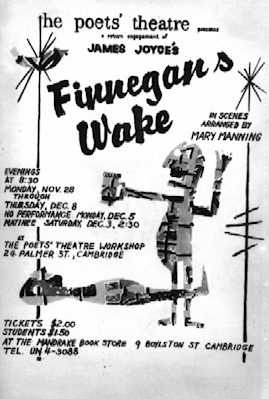

|
Mary Manning Howe
[1905-1999] The Poets' Theatre Finnegans Wake plus a 1955 review from The Harvard Crimson |

|

Above:
poster from: The Voice Of Shem, 1955 Poets' Theatre, Cambridge from the blog: Libellus Samedi 3 mai 2008 |
|
from The Harvard Crimson
Finnegans Wake
Credit for the formidable task of winnowing out a set of passages simultaneously suited to the theatre and representative of the book, belongs to Mary Manning, who selected and organized the scenes as well as ably directing the production. It would be quite impossible to distill Joyce's monolith into two hours of speech and song and still retain all the thematic complexities, with their continual restatement in terms of almost everything in myth and history. Miss Manning has been wise in not attempting this, for the result could only be tedious and disastrously confusing. Her arrangement retains a circular form, opening and closing with the members of the wake gathered about the omnipresent coffin-cradle of Finnegan. She has made Shem the Penman spokesman for her piece, and although his antithetical brother Shaun is absent as an explicit character, he does appear in his incarnations of Ondt and Jaunty Jan during the H. C. Earwicker dream sequences. The theme of the river-mother, Anna Livia, is powerfully revealed in the washerwomen episode and successfully picked up and completed in the final scene, to round out the major cycle of the book. But the success of Miss Manning's adaptation depends very strongly on skillful and imaginative presentation. Here also the group is astoundingly adept. It would be hard to imagine lines demanding closer attention in delivery than those of Finnegans Wake, yet the cast handles them with universal aplomb. Breaking up the speeches among various characters on the stage does away with the monologue effects one is liable to get in reading, when often the various speakers are practically indistinguishable. Moreover, though many of Joyce's visual puns are lost in the transition to the stage, the actors' interpretations through pantomime and inflection clear up a number of obscurities and carry the auditor happily through scenes where he might easily be left wallowing in confusion. Highlighting this generally excellent cast are Tom Clancy, as Shem the Penman, Sarah Braverman, as Anna Livia, and Ed Chamberlain and Jac Rogers in a variety of roles. Ken Donahue was entirely enjoyable as everyman H.C.E., although as a result of the adaptation his major function throughout much of the play was to sleep atop the coffin. Joseph Mitchell lent delicacy at appropriate moments in several parts, especially during the dream dramas of H. C. Earwicker which occupied most of the second half of the production, and which were in many ways the most purely entertaining part of the evening. Beyond this, a great share of praise for the success of Finnegans Wake must go to Roger Graef, whose musical arrangements worked around and through the language and the acting to supply gaiety and pathos when required, and generally add immeasurably to the vitality of the production. Nora White Shattuck's choreogrpahy was also a prominent and amusing addition. In biting off Finnegans Wake, the Poets' Theatre fortunately discovered that its eyes were not bigger than its stomach. In fact, this choice offering of rich Joycean language should satisfy the most demanding of theatrical gourmets. http://www.thecrimson.com/article.aspx?ref=489131 |
